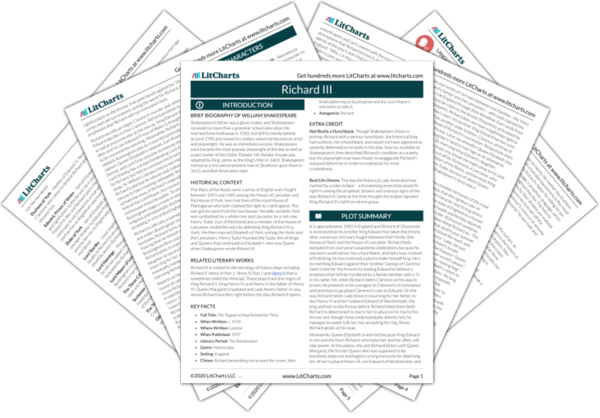Summary
Analysis
Richard of Gloucester enters alone and sets the scene, opening with one of Shakespeare's most famous lines: "Now is the winter of our discontent." Though it's technically summer, it is winter from Richard's perspective because he is unhappy. His family, the House of York, has emerged victorious from the Wars of the Roses and all around him people are celebrating and enjoying peacetime. Richard paints an image of "grim-visag'd war" turned into a lover, chasing women, not enemies. Yet the sour-tempered, hunchback Richard, "not shap'd for sportive tricks, nor made to court and amorous looking glass," feels he cannot take part in the frolicking. Angry, he feels cheated by "dissembling nature" which caused him to be born premature, "deform'd," and unattractive.
Richard is one unhappy guy. He's unable to enjoy the pleasures of summer and feels alienated from the happy people celebrating a long-awaited peacetime after the drawn-out Wars of the Roses. Though a big reason Richard may be excluded from other people's celebrations is his sour temper and desire for power, Richard focuses on other reasons: he has a hunchback and was born with unattractive features. These handicaps, he feels, make him powerless to hold his own in romantic courtship or other peacetime pursuits.
Themes
Literary Devices
If he "cannot prove a lover," Richard thinks, he is "determined to prove a villain, and hate the idle pleasures of these days." He has already laid "plots, inductions dangerous," "drunken prophecies, libels, and dreams" to set his brothers, Clarence and King Edward, against one another and expects Clarence to be killed because of a prophecy (spread around by Richard) that Edward will be murdered by an heir associated with the letter ‘G.'
Because he feels excluded from romance and peacetime pleasures, Richard decides to ruin those experiences for everyone else. He will empower himself by contriving a plot, he confides to the audience—setting himself up as a kind of "director" of the plot and the audience as his confidante—and has made up lies and supernatural omens to manipulate his brothers into hating each other.
Themes
Literary Devices
Clarence enters guarded by the Tower's lieutenant Brackenbury in armed escort to the Tower (the king's prison). He explains to Richard that he is under arrest because his given name is George and Edward has been convinced by a prophecy that he will be murdered by a ‘G.' Richard explains that Edward's domineering wife, Queen Elizabeth, must be behind this, as she recently convinced her husband to imprison Lord Hastings, who was just finally released that day. Hastings won his freedom by appealing to the queen. Clarence and Richard agree it's crucial to position themselves in the good graces of the queen and of the king's mistress, Mistress Shore.
Richard's plot is already being put into action. Richard's manipulative way with words – casting blame on others, pretending to be sympathetic, making up fake reasons for situations he himself has caused – is al in evidence here. Clarence is convinced by Richard and doesn't suspect Richard is actually the reason he's under arrest. More specifically, here Richard is tricking his rival (Clarence) into complacency while also setting up the Queen (another rival) to be blamed for Clarence's death.
Themes
Brackenbury interrupts, saying that King Edward has forbidden anyone to speak privately with Clarence. Richard replies that there's nothing private about their talk and welcomes Brackenbury into it – "we speak no treason," he says, he and Clarence are just complimenting King Richard, Queen Elizabeth, and their relatives. Brackenbury apologizes. Richard promises Clarence he will do everything possible to free him. But as soon as Clarence and Brackenbury exit, Richard confides that he will send "simple, plain" Clarence to his death.
Richard is lying to Brackenbury – he has just been bad-mouthing Queen Elizabeth to Clarence and calling her manipulative. Of course, it is Richard himself who's doing the manipulating here. Yet even after hearing his brother lie outright, Clarence seems to trust Richard's promises to help. As soon as Clarence is out of earshot, Richard tells the audience just how hollow those promises are.
Themes
Get the entire Richard III LitChart as a printable PDF.

Hastings enters and Richard congratulates him on his freedom. Hastings is dismayed to hear that Clarence is imprisoned. He tells Richard that the king is in bed "sickly, weak, and melancholy" and Richard pretends to be upset. Hastings exits and Richard notes to himself that Hastings should die, too, after Clarence. He recounts his plan to stoke King Edward's hatred of Clarence, wait for Edward to die of sickness, and then marry Lady Anne, whose father (King Henry VI) and husband (Edward of Westminster) Richard himself killed. He'll marry her not out of love but "for another secret close intent." Richard then chides himself for thinking so far into the future while Clarence and Edward are still alive, and exits.
Again, Richard proves what a good liar he is by pretending to be sympathetic to Hastings' face, then changing his tune as soon as Hastings leaves. Richard's plot thickens. It now involves three deaths and a marriage. Like a good director, Richard keeps both the big and the small picture in view: he has a grand vision (which he is keeping secret from everyone but the audience for now) but is also mindful of the order in which a plot's individual events occur and reminds himself to approach his plot step-by-step.
Themes












